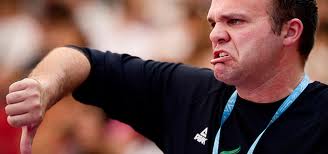
Apr 03, 2012 • 5 min read
Tough Love or Verbal Abuse?
Posted in:
 Since I started blogging on this site about a year ago, I’ve written extensively about parents who behave badly at tryouts, practices and games. Those yellers, screamers, and tantrum-throwers who think they always know better than the coach–and love to let the coach know. And the one-uppers who never miss an opportunity to tell you how much better their children are than yours. Even the back-stabbers, who act like they’re your friends but then spend hours talking to the coach, trying to get their children more playing time than all the others.
Since I started blogging on this site about a year ago, I’ve written extensively about parents who behave badly at tryouts, practices and games. Those yellers, screamers, and tantrum-throwers who think they always know better than the coach–and love to let the coach know. And the one-uppers who never miss an opportunity to tell you how much better their children are than yours. Even the back-stabbers, who act like they’re your friends but then spend hours talking to the coach, trying to get their children more playing time than all the others.
But today, I want to talk about badly behaving coaches. So much attention is now being paid to the ‘helicopter parent problem’ — don’t get me wrong, that’s a good thing — that the problem of out of control, even abusive, coaches is not recognized. And that’s most definitely a bad thing.
I was particularly struck by the story out of Lynn, Massachusetts a few weeks ago. A youth hockey coach yelled at a 9-year-old player and threw a bag of pucks at his twin brother because the boy asked the referee for the puck after he scored his 200th goal. After an investigation by its own board, which I hardly call impartial, the hockey league decided to support the coach and not the family — or the children. What’s more, they voted to kick the boys out of the league! Isn’t youth sports about the ‘youth’? Apparently not.
Stories differ on the prior behavior of the mother of the boys, but to be honest, no matter how difficult or demanding she was or is, there is absolutely nothing that condones yelling and throwing pucks — emotional and physical abuse — by a coach. In any sport. Ever.
The boy is quoted as saying he was “shocked and started to get scared” and “the coaches were mean.” Since when is that what we want kids to feel — at 9 years old, no less — playing a sport? They are supposed to be having fun, not shaking in their skates.
I also read the quote from an assistant coach, justifying his friend’s behavior by saying, “We are hockey coaches. Do we yell? Yeah, we do, but it’s no different than any other sport.” Really? The old, “Everyone else does it, so it’s ok” excuse? I swear I heard my mom whispering in my ear, “So if the other kids jump off the bridge, are you going to jump too?”
Unfortunately, this is not the first situation of abuse by a coach about which I’ve seen or heard. Sadly, it’s also not the first case in which a league has allowed an abusive coach to continue coaching after a complaint. I personally know of a baseball coach who physically slammed a child up against the dugout wall. Another parent reported it. The incident was brushed off by the league because it was the coach’s own child. Don’t get me started.
I also recommended expelling a youth baseball coach in that same league who lost complete control at a game. I was only granted a suspension of three games–and I saw him coaching again the next year, after I had left the board. More kids subjected to his yelling and tantrum-throwing. Sigh.
In addition, I know a soccer coach who yells and screams at his players for the entire game (not just instructions, but derogatory statements of their lack of skill or understanding of the game), taunts the opposing coaches and players (yes, a grown man taunting pre-teen girls), and his league continues to protect him, year in and year out.
What did all these situations have in common? These teams won–and won big. Our country’s youth sports culture covets winning over everything, including the physical and emotional well-being of even the youngest players. The culture is teaching kids to be quiet about abuse or face retribution. Where have we heard that before?
I think it’s time for youth sports leagues to not only give lip service to but rather truly enforce a coach’s code of conduct, and ensure that the children playing the sport — not the adult coaches — are those who are protected. At the end of the day, winning really isn’t the hallmark of a good youth sports team. Happy, smiling kids who can’t wait to go to practice or a game are how you should judge a successful coach–and team.
Has your league taken on the difficult task of expelling a verbally or emotionally abusive coach? Does your league have hard and fast guidelines dictating what kind of coaching language is allowed and what is considered abusive? Has your child been emotionally abused by a coach? Let us know–and what steps you took to remedy the situation.
Emily Cohen is a freelance writer living in Berkeley, California. An avid tennis player and swimmer, Emily has a son who plays high school baseball and a daughter who plays Class I soccer and middle school volleyball. She has been a team manager for a number of her children’s sports teams. You can find Emily’s bi-weekly blog about team management and youth sports parenting here at tsblogadmin.wpengine.com. Follow her on Twitter at @emilygcohen or email her at emily@emily-writes.com
